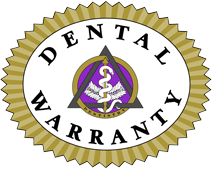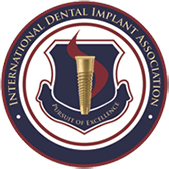In recent years, dental implants have allowed millions of Americans the opportunity to replace damaged and deteriorated teeth with permanent, durable substitutes. According to the American Academy of Implant Dentistry, the success rate of these groundbreaking procedures is a remarkable 98%. The implants themselves are, in essence, threaded screws made of materials such as titanium form a strong  bond with the jawbone. These form the metal “roots” of your new teeth. On top of each implant sits a connecting abutment topped with a dental prosthetic that mimics a natural tooth. Because they offer a permanent solution to lost or damaged teeth, dental implants have become a very popular alternative to dentures in recent years. Because dental implants are a relatively new innovation, however, many of our patients still have some lingering questions about the procedure.
bond with the jawbone. These form the metal “roots” of your new teeth. On top of each implant sits a connecting abutment topped with a dental prosthetic that mimics a natural tooth. Because they offer a permanent solution to lost or damaged teeth, dental implants have become a very popular alternative to dentures in recent years. Because dental implants are a relatively new innovation, however, many of our patients still have some lingering questions about the procedure.
How Long Do Dental Implants Last?
Assuming you maintain your oral hygiene regimen with regular brushing and flossing, dental implants can last a lifetime. Compare this to the typical lifespan of a crown, which is typically between 10 and 15 years. Bear in mind that the location of the implants may also have some influence on their longevity; molar implants tend to be subject to more stress from chewing, so they may wear out faster than incisor implants at the front of the mouth. Certain preexisting medical conditions such as diabetes can also increase the chance of eventual implant failure. In general, though, implants last for a very long time.
How Long does the Healing Process Take?
Post-surgery healing times vary from person to person, but generally speaking it takes about two to four months for implants to heal and bond to the jawbone completely. During the healing period, it’s important that patients take care not to stress the implants by applying unnecessary force from chewing and biting. Likewise, during the recovery period patients should adhere to a diet of soft foods.
Do I need to Go to a specialist for Dental Implants?
While all general dentists are legally permitted to perform implant procedures, many will refer you to a specialist if they don’t routinely do the procedure themselves. Here at Modern Family Dental, our resident expert Dr. Taj Haynes is a member of the International Dental Implant Association. We’ve had years of experience performing successful implant and dental implant restoration procedures for our patients under his guidance.
Are Standard Dental Implants Better Than Mini Dental Implants?
As their name suggests, mini implants are a smaller, simpler alternative to standard implants. Mini implants are most often used in patients who suffer from jaw bone deterioration. In these cases, more mini implants are used in order to achieve the same support and stability as standard implants. In general, the best solution is always to use the largest possible implant for maximum support.
What Problems Can Happen With Dental Implants?
As with natural teeth, dental implants do require regular brushing and flossing. Of course you won’t get cavities in your dental implants, but you will still need to maintain the health of your gums and jaw. The bacteria associated with gum disease can cause bone deterioration which can lead to implant failure. As we mentioned earlier, certain preexisting medical conditions can also contribute to implant failure. These should be addressed by your dentist before you commit to the procedure. As long as you have your implants installed by an experienced professional and take good care of them in the years following the procedure, the risks associated with dental implants are very minimal.
If I Have Dentures, Should I Stabilize Them With Implants?
Using implants to secure your dentures can make wearing dentures far more comfortable. Dentures stabilized with implants are easier to chew with, require no adhesive, and are less likely to make your gums sore. As long as your gums and jawbone are in good health, this is a great option to consider if you’re already wearing dentures, but aren’t ready to commit to a full set of implants.
Want to learn more about dental implant surgery? Contact us today to schedule a consultation with one of our Charlotte dentists and we’ll walk you through the whole process from start to finish. We look forward to hearing from you!






